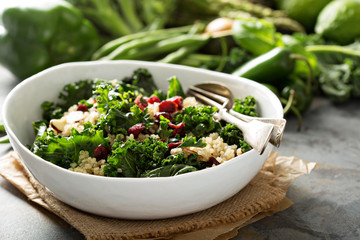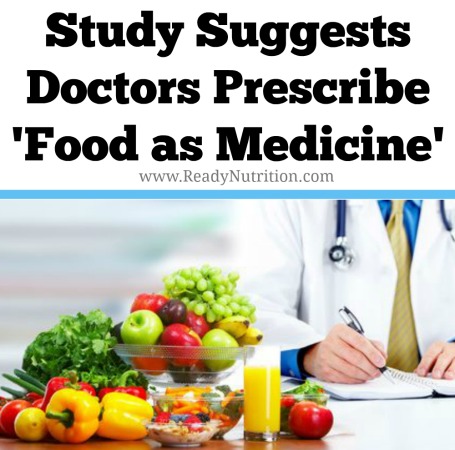A new study suggests that doctors return to more natural and holistic roots by prescribing healthy foods and an improved diet for some Americans. Long stuck in a culture where unhealthy diets and chemical-laden foods have become normal, many doctors are now breaking the mold – but it’s good and bad at the same time.
Those doctors who choose to prescribe a healthy diet feel that simply improving the quality of the foods a person eats could save the healthcare industry billions of dollars. Although this is far from a new concept, it is nice to see Western medicine doctors try something new instead of jumping to prescribe the latest and greatest Big Pharma pill loaded with side effects. These pill prescriptions also come at a time when a patient is already sick while prescribing a healthy diet could prevent major costs down the road. In an effort to stop a preventable disease before it starts, some researchers and medical professionals are pushing for programs that would let doctors prescribe healthy foods and force insurers to cover those foods. This would inevitably lead to a change in eating habits that could help patients shift to a health-promoting diet from a disease-causing one, the researchers have claimed.
Related article: 19 Foods That Eat the Stress Away
According to Popular Science, these types of healthy eating programs work. Subsidizing fruits, vegetables, and other healthy foods under Medicare and Medicaid could prevent millions of cases, as well as the deaths associated from cardiovascular disease, according to a new model. It would prevent hundreds of thousands of diabetes cases, as well, and save billions of dollars in healthcare costs.
 “The power of food as medicine is increasingly clear,” said the study’s author Dariush Mozaffarian, dean of the Friedman School of Nutrition Science and Policy at Tufts University. The idea of treating food (which is the nourishment we all need to survive) as a key element of healthcare is catching on across the healthcare industry, says Rita Nguyen, Medical Director of Healthy Food Initiatives at Zuckerberg San Francisco General Hospital. “People are recognizing the common sense of it all,” she says. “We spend so much on healthcare, and our outcomes are abysmal. We don’t invest in prevention.” And many are now saying a switch to healthier eating habits is all that’s needed to improve your chances of well-being.
“The power of food as medicine is increasingly clear,” said the study’s author Dariush Mozaffarian, dean of the Friedman School of Nutrition Science and Policy at Tufts University. The idea of treating food (which is the nourishment we all need to survive) as a key element of healthcare is catching on across the healthcare industry, says Rita Nguyen, Medical Director of Healthy Food Initiatives at Zuckerberg San Francisco General Hospital. “People are recognizing the common sense of it all,” she says. “We spend so much on healthcare, and our outcomes are abysmal. We don’t invest in prevention.” And many are now saying a switch to healthier eating habits is all that’s needed to improve your chances of well-being.
Of course, it isn’t nearly as fun to eat a kale salad as it is to chow down on a bacon cheeseburger, but those more health conscious people who make better decisions when it comes to what they eat tend to be healthier and spend less money on medical care overall. They also tend to live longer than their junk food addict friends. But there is one caveat. The prescription is actually paid for by the taxpayer in the form of food subsidies.
The study team found that subsidizing fruits and vegetables would prevent 1.93 million cardiovascular events, like heart attacks, and 350,000 deaths from the conditions. It could also prevent 620,000 deaths, and 120,000 cases of diabetes. The fruits and vegetables program would save taxpayers nearly $40 billion in healthcare costs, and the addition of other healthy foods would save over $100 billion. Doctors admit that there would be a cost burden, but it would be offset by those on taxpayer-funded healthcare programs becoming much healthier.
“It costs money, but most of that is offset by lower healthcare costs,” Mozaffarian says. “When you look at the cost per year of life saved, all of the interventions were extremely cost-effective.” It’s just as cost-effective, he says, as paying for drugs to prevent high blood pressure. “So many of us want health insurance companies to recognize the value of food,” Nguyen says. “It’s not because we’re ‘bleeding heart liberals.’ It’s based on the science. When you give people food, and healthy food, it saves money.”
But without any kind of nutritional education, the program may be doomed. Just paying for another person’s vegetables does not mean they will eat them. It could be a cost that won’t pay off in the end. According to Popular Science, however, there are studies underway about the efficacy of a program such as this one. A $6 million study in California is providing “medically tailored” meals to patients. Additionally, the 2018 Farm Bill included $25 million in funding for produce prescription pilot studies. “These ‘food as medicine’ approaches are gaining real traction,” Mozaffarian says. “If pilot studies are implemented and work, there’s a very real chance you could in the near future go to the doctor, a doctor could write a prescription for food, and an insurance company will pay for part.”
Access to healthcare isn’t the main concern for the researchers who conducted this study and it appears that many doctors now seem to be interested in finally treating the actual problem rather than controlling the symptoms of a disease. This is both good and bad. It could lead to less choice, which is fundamentally vital to human beings mental state, but it could lower the costs of caring for those who are already using government welfare to buy food and see a doctor.
When your health is your problem and the costs of damaging your body are on you and not your neighbor (in the form of welfare like food stamps, Medicaid, and other forms of welfare) you will take care of yourself. When it doesn’t matter how unhealthy you are because someone else will foot the bill, the system is already designed to fail. It doesn’t look like that was taken into consideration when conducting this study, and human nature should have been accounted for. Obviously, there are good and bad things about the outcome of the study.
But does the good outweigh the bad?


High time. We cannot terrorize our health by wrong eating and expect a drug to fix the problem. But there’s a huge controversy about what constitutes healthy food? So far the experts cannot even agree on what healthy food is. Is it not the very foods that has caused the health crisis that we currently face? First sort that out.